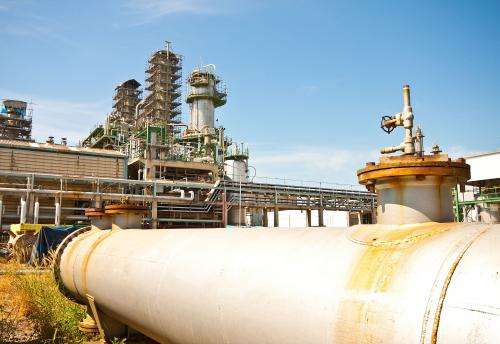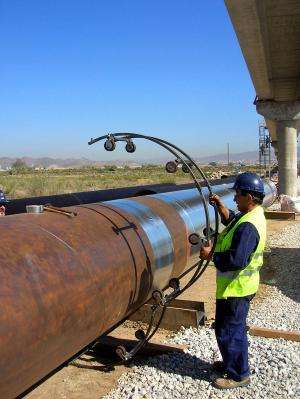With mobile laboratories, we accelerated 20 years in fighting pipeline corrosion

Mexico could recover from a lag of 20 years in technology to protect oil pipelines from corrosion, thanks to a model developed at the National Autonomous University of Mexico (UNAM), which creates mobile laboratories to reach the places where the severe corrosion problems occur and apply a technique called "cathodic protection" to protect pipes.
To make the solution more efficient, mobile laboratories became incubated companies by the UNAM, leaded by graduate students of the Institute of Physics.
Corrosion is a very big issue for the oil industry and affects drinking water systems worldwide. Millions of cubic meters of water are wasted every day by fractures of the pipes that carry it, but this degradation of metal ducts is more severe for the oil industry because it can cause explosions, spills of gasoline and result in damage to the environment and society. Because of these risks, since the 1980s, the protection against corrosion in pipelines has been a legal obligation to be met by Petróleos Mexicanos (Mexican Oil; PEMEX).
The central idea of cathodic protection can be explained by a comparison with how voltaic batteries work. There are two main parts: the cathodes, which will not rust or release metal, and the anodes, which disintegrate with time and the release of electrons.
"From the beginning, the idea is to turn the whole tube into a cathode, with so-called cathodic protection. How do we do this? We bury an anode next to it and then we force the complete circuit. The anode, as we know, will be damaged, exposed to a more aggressive corrosion. That is when electricity emerges from the metal. To delay the wear, we can apply to the anode or its output a protecting alloy of titanium coated with a layer of mixed rare-earth oxides," said Lorenzo Martínez Gómez, emeritus researcher at the Institute of Physics of the UNAM, world expert in metals electrochemistry and member of the Permanent Seminar of Sciences and Technologies in Mexico in the XXI Century.
Science and business
The idea of creating mobile laboratories against corrosion and turn them into a spin-off to bring the solution required by the pipelines was conceived by Lorenzo Martínez Gómez, who is convinced that they had to take the knowledge about corrosion out of universities and bring it to the work field, as this is the only way to recover from the great technological lag and severe losses faced by the Mexican oil industry.

"In the late 80's, I realized that leaving the lab and going to industry was needed, that's where the problem is. We decided to build a mobile laboratory, so we notified the UNAM, which supported us to integrate as a technology-based company. We launched the idea of investing money on mobile laboratories and that's how we got enough for two corrosion control systems in pipelines at airports. When PEMEX learned about us, it launched the challenge to have 10 of the labs in the field in 30 days. We took the challenge and started assembling laboratories," says the scientist, whose training includes engineering and physics.
Because the pipeline protection lag was of two or three decades, Lorenzo Martínez Gómez trained specialists in the subject and Mexico became the country with the youngest experts on this field worldwide. While specialists in cathodic protection are usually around 45 years of age, in Mexico, they are in their 20's.
"Young people joined enthusiastically and even surpass me in the company. They are the heads of the business. In the course of 10 years, this new institution was assembled, which provides the service and responds to PEMEX, thanks to recognizing Mexico's lag in addressing the phenomenon of corrosion," says the scientist.
"Globally, there are four levels of cathodic protection experts: I'm level four, which is the highest, but my biggest challenge was to train these young people and bring them to the same level. They seized the challenge seriously. While studying for a doctorate during certification, they reached level four, and currently, they are the youngest worldwide with this level of certification. Then there are other young people who are already are at level three, more who are at level two; around 200 specialists are already in a career of continuous improvement,"said Martínez Gómez.
Provided by Investigación y Desarrollo


















